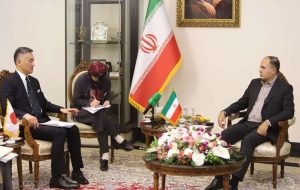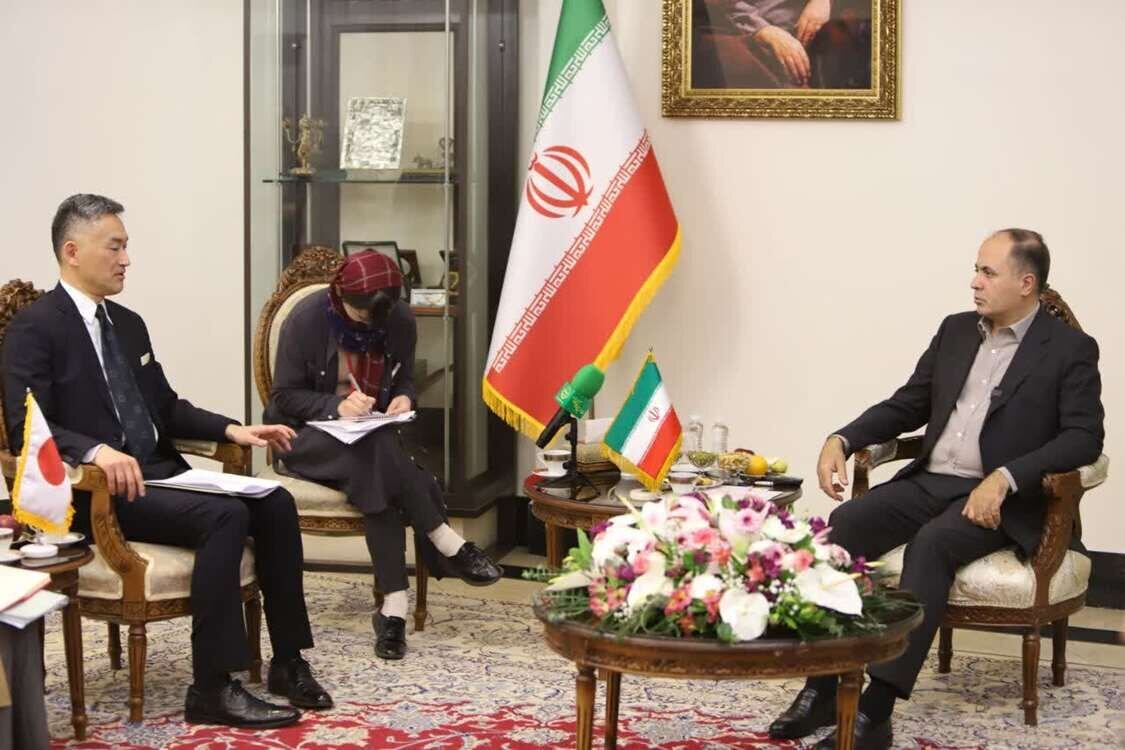‘Iran can become transit corridor for transferring Japanese products’
TEHRAN – Iran’s transit corridor which is a regional hub can play a significant role in transporting Japanese products in the region, Iranian Agriculture Minister Gholamreza Nouri Ghezeljeh said in a meeting with Japanese Ambassador to Iran Tamaki Tsukada. “The deep relations between Iran and Japan on environmental issues, especially water, are a good basis


TEHRAN – Iran’s transit corridor which is a regional hub can play a significant role in transporting Japanese products in the region, Iranian Agriculture Minister Gholamreza Nouri Ghezeljeh said in a meeting with Japanese Ambassador to Iran Tamaki Tsukada.
“The deep relations between Iran and Japan on environmental issues, especially water, are a good basis for expanding relations between the two countries,” Nouri said.
Japanese Ambassador, for his part, referred to his trip to the northwestern provinces of Iran and Lake Urmia, saying that key topics were discussed regarding agriculture, water management, and the restoration of Lake Urmia in the presence of the head of the Iran-Japan parliamentary group.
In October 2023, former Iranian Vice President Mohammad Mokhber proposed a comprehensive transit to link all the Shanghai Cooperation Organization (SCO) member states through Iran.
In his speech, he expressed Iran’s readiness to provide transit opportunities to SCO member states for the North-South and East-West corridors.
“Iran is ready to create a comprehensive transit corridor to connect the member countries of SCO. In line with that goal, it has already taken important steps in the form of the North-South Corridor, which, with its full realization, the commercial and economic access from South and East Asia to the countries of Central Asia, Caucasus, Russia, Black Sea and Europe will be facilitated.”
“Iran is a territory of transit and logistics opportunities. In this regard, we are ready to create a transit corridor for the accession of SCO member countries,” Mokhber also said.
In early November, the Tehran Chamber of Commerce, Industries, Mines and Agriculture (TCCIMA) hosted a meeting with Japan’s Ambassador to Tehran Tamaki Tsukada in which the two sides explored avenues for economic cooperation.
As the TCCIMA portal reported, in this meeting, the two sides exchanged views on creating a platform for the development of economic relations between the private sectors of the two countries and discussed ways of improving trade relations between Iran and Japan.
In an interview recently conducted by Tasnim news agency, the Japanese envoy has said that the Japanese companies are interested in cooperating with Iran in the energy sector, especially in the hydrogen and ammoniac fields.
“Japanese companies are interested in participation in Iran’s energy sector like overhaul of factories and energy equipment,” Tsukada stated.
Mentioning the long-lasting history of cooperation between the two countries and the negative impacts that the U.S. sanctions have had on the level of economic exchanges between the two countries, the ambassador said: “If the international conditions improve, I am sure that oil and energy companies in Japan will again show their interest in participating in the Iranian market.”
The envoy estimated the current value of trade between the two countries at about $100 million, noting that this figure is significantly low considering the two sides’ capacities and potential for expanding economic ties.
Also, in a meeting between Iranian Transport and Urban Development Minister Farzaneh Sadegh and Japan’s ambassador to Tehran in late October, the two sides stressed cooperation in transportation, infrastructure, and technology development.
Speaking in the meeting, Sadegh underlined Iran’s geopolitical position as the link between East and West and said: “Japan can reach countries in the region, including Central Asia and the Caucasus, through Iran.”
She further noted that the two countries can expand their cooperation in areas such as intelligent transportation systems, safety, transportation infrastructure technologies, and smart and earthquake-resistant urban construction technologies.
The minister invited Japanese officials to visit Iran to get familiar with the capabilities and capacities of the Islamic Republic of Iran, including the country’s unique bridges and tunnels, and to discuss the areas for cooperation.
Another important issue discussed in this meeting was the need to establish direct flights between Iran and Japan, which was emphasized by both parties.
Sadegh also suggested that a meeting be held between the port officials of the two countries in order to examine the areas of cooperation in the field of maritime transportation.
The Japanese ambassador also pointed to the long-standing and historical relations between Iran and Japan and said: “The thousand-year history of the relationship between the two countries has provided a good basis for deepening joint cooperation in the field of human settlement, exchange of knowledge, technology and holding training courses.”
He expressed satisfaction with the progress achieved in this field and called for further development of such cooperation.
EF/MA
Photo: Iranian Agriculture Minister Gholamreza Nouri Ghezeljeh (R) and Japanese Ambassador to Iran Tamaki Tsukada
